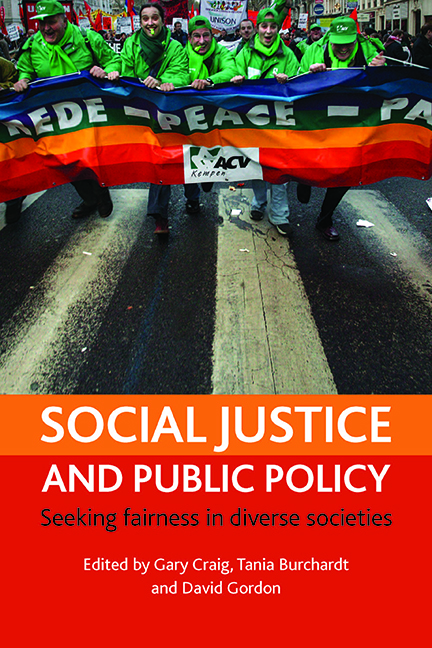Book contents
- Frontmatter
- Dedication
- Contents
- Acknowledgements
- Notes on contributors
- Introduction
- one Social justice and public policy: a view from political philosophy
- two Social justice and public policy: a social policy perspective
- three Multiculturalism, social justice and the welfare state
- four Structural injustice and the politics of difference
- five Recognition and voice: the challenge for social justice
- six Globalisation, social justice and the politics of aid
- seven Social justice and the family
- eight Children, policy and social justice
- nine Social justice in the UK: one route or four?
- ten Monitoring inequality: putting the capability approach to work
- eleven The limits of compromise? Social justice, ‘race’ and multiculturalism
- twelve Understanding environmental justice: making the connection between sustainable development and social justice
twelve - Understanding environmental justice: making the connection between sustainable development and social justice
Published online by Cambridge University Press: 19 January 2022
- Frontmatter
- Dedication
- Contents
- Acknowledgements
- Notes on contributors
- Introduction
- one Social justice and public policy: a view from political philosophy
- two Social justice and public policy: a social policy perspective
- three Multiculturalism, social justice and the welfare state
- four Structural injustice and the politics of difference
- five Recognition and voice: the challenge for social justice
- six Globalisation, social justice and the politics of aid
- seven Social justice and the family
- eight Children, policy and social justice
- nine Social justice in the UK: one route or four?
- ten Monitoring inequality: putting the capability approach to work
- eleven The limits of compromise? Social justice, ‘race’ and multiculturalism
- twelve Understanding environmental justice: making the connection between sustainable development and social justice
Summary
Introduction
Debates on sustainability and the concept of environmental justice reflect a number of macro-arguments on the theory of social justice and distributive justice. There are a number of conundrums within the construct of social justice as it relates to environmental and sustainable development policy. This chapter aims, first, to provide a theoretical understanding of the main issues and second, to illustrate the application of environmental justice theory at UK policy level.
The chapter begins with the concepts of sustainability and environmental justice both at UK and global levels, exploring the constructs of human rights, participation and governance. This discussion leads into a focus on the interpretation of environmental justice at grassroots and policy levels in the UK. It examines the social distribution of the urban and natural environment and its connections to ‘race’ and income. Finally, it reflects on how theory and interpretation interplay with social policy in relation to government agendas on race relations, social inclusion and regeneration.
Concepts of sustainable development and social Justice
Humanity has the ability to make development sustainable – to ensure that it meets the needs of the present without compromising the ability of the future to meet their own needs. (Brundtland, 1987, p 8)
The United Nations Conference on Human Environment in 1972 is often identified as the watershed for sustainable development discourse. The search for international cooperation on major global issues brought industrialised and ‘developing’ countries to design a new form of development. This conference stipulated that any agenda for development must include a healthy and productive environment for all humans. More than a decade later, the Brundtland Commission was given the task of framing a new form of equitable development balancing economic, environment and social needs:
What is needed is a new era of economic growth … that is forceful and at the same time socially and environmentally responsible … together we should span the globe, and pull together to formulate an interdisciplinary integrated approach to global concerns. (Brundtland, 1987, p xii)
There seems to be no one uncontested definition of sustainable development, although most agree that its objectives are similar to those proposed by Brundtland.
- Type
- Chapter
- Information
- Social Justice and Public PolicySeeking Fairness in Diverse Societies, pp. 251 - 275Publisher: Bristol University PressPrint publication year: 2008



